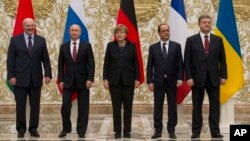When the leaders of four major countries convene at a neutral location for high-profile talks aimed at ending a war, results are expected.
It took all night – 16 hours in all – but they got results. The questions now are whether they can implement their agreement, and whether it will be enough to end the conflict.
There is a good chance that they can’t, and it’s not.
The agreement calls for a cease-fire, the withdrawal of forces to create a wide buffer zone, the exchange of prisoners and a commitment to pursue a political solution.
Faint praise
But even the initiators of this round of talks were cautious about what they had achieved. French President Francois Hollande acknowledged the full details have not been worked out. German Chancellor Angela Merkel said the agreement gives hope, but also described it unenthusiastically as “better than no agreement at all.”
Paradoxically, Russian President Vladimir Putin agreed to the withdrawal of all foreign fighters from Ukraine, even though he has denied sending in any troops. He has said any Russians fighting in eastern Ukraine are volunteers.
Still, Hollande praised Putin for pressuring the rebels to agree to the deal. The talks reportedly nearly broke down over whether the rebels would be allowed to keep the territory they gained in recent weeks, after violating the previous cease-fire.
Apparently, they are to withdraw back to the old line. But that is two weeks away, and much can happen during that time to facilitate or scuttle the plan.
Like the previous Minsk accords signed last September, this agreement provides a pathway to end the fighting and move toward a political settlement between the elected government in Kyiv and the Russian-backed rebels. And like the previous agreements, the success or failure of this one will largely depend on whether Putin is satisfied that his concerns about Ukraine’s shift to the West have been sufficiently eased.
Broader Russian concerns
The rebels he supports claim two large regions along the Russian border, but only control about a third of the area. They want independence, but this agreement only promises reforms and autonomy.
Ukrainian President Petro Poroshenko, who has been offering greater local powers to the eastern regions for months, said it does not go as far as Russia and the rebels had wanted.
But Putin’s concerns are far broader. He wants to restore his influence in Ukraine after the ouster of the pro-Russian president a year ago. And he wants to prevent Ukraine from joining the European Union or NATO.
Ukraine and its friends in the West say that is none of Russia’s business. But experts say Putin sees such moves as existential threats to his country.
So some as-yet-undefined compromise may be needed, perhaps involving the timing and extent of Ukraine’s involvement with the Western alliances.
Otherwise, Russia can be expected to continue supporting the rebels and trying to destabilize the Ukrainian government and hamper its efforts at reforms, economic development and closer relations with the West.
The main impetus for these talks was discussion in Washington about selling defensive weapons to Ukraine to help it respond to the rebel offensive. That would have raised the stakes – potentially causing more Russian casualties and possibly resulting in more Russian involvement, perhaps including officially sending military units into eastern Ukraine, and attacking Ukrainian or Western interests elsewhere.
Hollande and Merkel were determined to avoid that kind of escalation, and used the possibility of U.S. arms sales to bring Putin to the negotiating table.
Andrew Wilson, author of "Ukraine Crisis: What it Means for the West," told VOA the pressure worked.
"Whether arming Ukraine is right or wrong, the threat of sending arms has clearly concentrated Russia’s mind," he said. "It would like to bank its gains now, before uncertainty increases."
"If there is a coherent strategic objective, it is to raise the direct political cost for Putin on this," said Daragh McDowell of the British risk assessment firm Verisk Maplecroft.
Will Russia escalate?
But on the eve of the talks, Putin sent a message that he, too, can raise the cost. Several rockets from rebel positions hit in the large government-controlled city of Kramatorsk, killing seven people and injuring more than 20.
"I think that’s a warning from Russia that there are still many rungs on the escalation ladder they can go up," McDowell said.
Speaking before the agreement was reached, neither expert was optimistic that the conflict will end anytime soon, nor that the underlying political disagreements will be resolved.
"A bad deal that also allows Russia to carry on interfering in the rest of Ukraine wouldn’t really be progress at all," said Wilson.
The leaders who met in Minsk promised to remain engaged to ensure the implementation of their agreement. But neither the Ukrainian government nor the rebels have changed their fundamental demands: the rebels for independence, the government for the unity of the country.
The good news is that the beleaguered people on both sides of the line in eastern Ukraine may get some relief from the daily shelling. Some of the more than 1 million who have fled their homes may even be able to return.
But the long term remains as uncertain as ever.
Watch related video by Zlatica Hoke:










